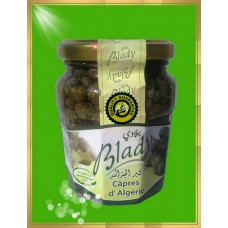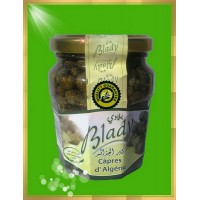Caper is widely used in southern cooking as a
condiment: it is usually candied in vinegar but can also be preserved in salt,
olive oil or wine.
The smallest capers are the most sought after in
gastronomy: their taste is more delicate and their aroma more pronounced.
Caper is a condiment particularly rich in vitamins,
minerals and trace elements but also in precious antioxidants which oppose
oxidative stress. These protect the body from cardiovascular pathologies,
certain cancers and other diseases linked to aging.
Nutritional values for 100 g of capers:
- Calories: 54 Kcal
- Proteins: 3 g
- Fat: 1 g
- Carbohydrates: 8 g
- Calories: 54 Kcal
Blady
thin capers
- Products:
fine capers
- Net
weight: 300 g
- Packing:
Glass jar
- Season: 2021
- Expiration date: 2023
| Local Products | |
| Blady Tapenade | Capers for better heart and brain health Used since ancient times in Greek and Roman dishes, capers are a staple in the preparation of Mediterranean dishes. Mainly produced in Algeria, Spain, Morocco and France, capers are actually non-flowering buds from the caper tree. Particularly tasty in pizzas, salads and fish dishes, capers are also very beneficial for our health. Among their beneficial effects on our health are: • elimination of toxins in the spleen and liver thanks to their diuretic properties; • maintenance and good health of the walls of the veins and arteries; • stimulation of appetite, especially in the case of anorexia or chronic loss of appetite; • the relief of infections such as wounds or mild skin conditions thanks to their antiseptic and antifungal effect when used in cosmetics or for use on the skin. Used to enhance dishes, capers also have medicinal potential. They contain a compound, quercetin, which acts on so-called KCNQ proteins. Proteins that form potassium channels, which regulate the entry and exit of potassium ions in cells. By doing this, the KCNQ channels contribute to heart rate, muscle contraction, pancreas, thyroid, and gastrointestinal tract function. So many things that quercetin in capers can directly regulate, according to a study published in Communications Biology. KCNQ channel dysfunction is associated with several diseases, including diabetes, cardiac arrhythmia, and epilepsy. Nutritional qualities Although very salty and with a strong taste, capers are very beneficial for our health. We thus find in capers a very large number of nutritional elements essential for the proper functioning of the body. Thus, consuming capers allows the body to receive the recommended daily allowances in: • magnesium, ideal for stimulating cognitive performance and preventing stiffness in the event of intense physical activity; • calcium, essential for healthy bones and teeth; • potassium; • vitamins A, B and C; • flavonoids, antioxidants that protect body cells from premature aging due to free radical attacks. |
Blady Capers
- Brand: Blady
- Product Code: 350g of Fine Capers
- Availability: In Stock
-
350DZD
- Ex Tax: 350DZD
Available Options
This product has a minimum quantity of 2
Related Products
Blady Capers
Caper is widely used in southern cooking as a condiment: it is usually candied in vinegar but can a..
350DZD Ex Tax: 350DZD
Tags: capers, tapenade, olive paste, local product




















